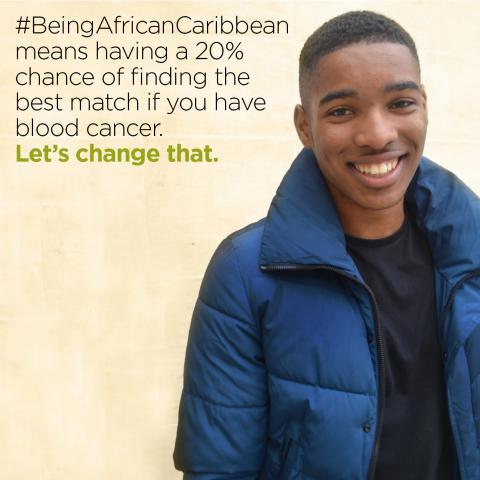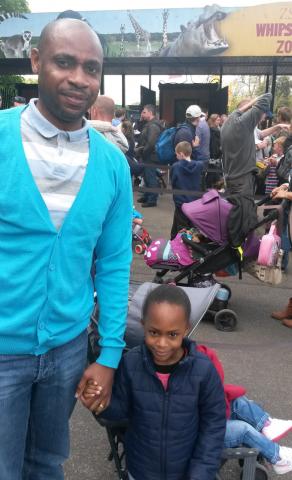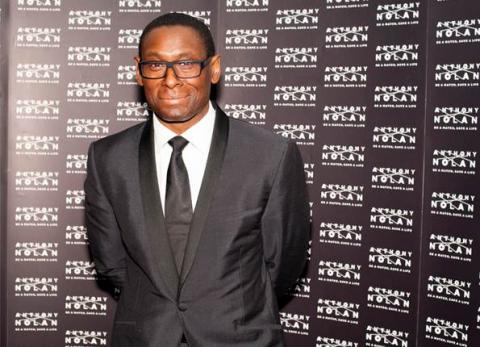There are now 30 times more white people than African-Caribbean people on the bone marrow register, we’re revealing today with the launch of our #BeingAfricanCaribbean campaign.
This is causing black people with leukaemia to miss out on their only chance of survival, as only 20% of them will find a perfect match.
Today, new research suggests the lack of black people who are willing to donate their stem cells (or bone marrow) may be due to poor awareness, combined with the integral role that family networks play within African-Caribbean cultures, according to a YouGov survey we've commissioned.
Today we’re launching a campaign with the African-Caribbean Leukaemia Trust (ACLT) to boost the numbers of black donors, backed by celebrities including David Harewood MBE, Richard Blackwood and Wretch 32.

Only 1 in 3 would be supportive if a young family member donated stem cells
The survey of 4,600 people revealed that just over one in three black respondents (37%) would be supportive if a young family member (16-21) wanted to donate stem cells, compared to nearly two-thirds (64%) of the overall sample.
Over a third of black people surveyed (35%) felt that donating for 16-17 year olds should require parental permission and nearly one in four (24%) felt that people aged 16-21 are too young to make this decision alone – again, higher than average and other ethnic groups.
Nearly one in ten black respondents (8%) said their family wouldn’t approve of donating stem cells – compared to just 1% of the total population and 12% of black people also viewed donating stem cells as a ‘dangerous activity’, the highest of any ethnicity.
Currently, there are around 550,000 people on the Anthony Nolan register but only 2.8% of these people are African-Caribbean.
‘I got a mixed reaction – people kept telling me not to do it’
Anderson Hall, 40, from Luton, was faced with misconceptions and distrust within his community, when he told people he was donating his stem cells to save the life of a child overseas after signing up at an ACLT donor drive.
“When I told people in my community what I was doing, I found that a lot of people didn’t know anything about it and they were very apprehensive,” said Anderson, who donated stem cells in December 2013.

Anderson Hall, stem cell donor
“I definitively got a mixed reaction, particularly from the older generation - but there was also a lack of knowledge even in the younger generation, which surprised me. People kept telling me not to do it or to not get involved with these things. They were worried about the kind of side effects it could have and how it could have a detrimental effect on my health.
“But for me it was just an amazing experience and a privilege to have a chance to change someone’s destiny and give a family hope.”
Worryingly, over a third (34%) of the older black generation, aged 35 and over, mistakenly associated donating stem cells with ‘cloning’, compared to just 18% of the overall sample.
But the survey indicates that there’s even less awareness of stem cell donation among the younger groups.
Just 18% of young black people aged 16-34 associated donating stem cells with ‘lifesaving’ and 14% associated it with ‘leukaemia’. Nearly one in five (18%) of the younger black generation have heard donating is painful, compared to 2% of those over 35.
‘Finding a donor was like looking for a needle in a haystack – we felt helpless’
The #BeingAfricanCaribbean campaign, run by Anthony Nolan and ACLT, aims to tackle the donor shortage by educating elders and influencers, as well as young people, within black communities.
Beverley De-Gale OBE, co-founder of ACLT, remembers the struggle she faced to find a donor for her late son Daniel.
“Like so many other families from ethnic minority communities, we faced an agonising wait to find a matching donor for our son; the odds were stacked against us, as we were told that there were only 550 black people on the Anthony Nolan register at that time, despite years of campaigning.
The pool of people was tiny, it was like looking for a needle in a haystack. We felt helpless.”
Beverley De-Gale and Orin Lewis set up the ACLT to fight for their son and others like him. Daniel became the UK’s first black stem cell transplant recipient after successfully finding a donor, but tragically died of an unrelated condition aged just 21.
Beverley added: “The answer to this heartbreaking situation is in our own communities.
We need the next generation of young black lifesavers to step up and join the Anthony Nolan register today.”
‘Being a match felt like winning the lottery’ – David Harewood
Hollywood actor David Harewood MBE, who has donated stem cells himself after joining the Anthony Nolan register via an ACLT donor drive at the Notting Hill Carnival, said:
“The call to say I was a match came completely out of the blue, I felt like I had won the lottery and I immediately wanted to do whatever I could to help. It gives you an incredible sense of achievement to know that you have stepped up and potentially saved a life.
Reflecting on the shortage of African-Caribbean donors, David said: “It’s horrible to think that if my daughters needed a transplant they would be at a disadvantage because there aren’t enough black and mixed race donors on the register.

David Harewood
Woe betide that should happen to you, that you should find yourself waiting for that one person who could save your child’s life but who thinks it is somebody else’s job.'
That’s why we need people to take responsibility and think, I could be that person who saves a life.”
Richard Blackwood, who is joining Eastenders next month, and rapper Wretch 32 have also lent their voices to the campaign in a new video.
‘Black people are dying – not because their donor isn’t out there, but because that person never joined the register’
Overall, black people are around three times less likely than white people to find a donor who is a perfect match. Ann O’Leary from Anthony Nolan has warned of the life-threatening inequalities faced by black people waiting for a donor.
“It is heartbreaking that African-Caribbean people may be literally dying, not because a matching donor for them isn’t out there somewhere – but because that person never joined the register,” said Ann.
“The closer the tissue match, the better the chances for the patient, and you’re most likely to find your match from someone in the same ethnic group.
Because there are tens of thousands of different tissue types out there, it means the odds are stacked against you if you’re African-Caribbean, as the pool of potential donors is so much smaller.
“We have a vital job to do – we must grow and diversify the bone marrow register. People’s lives depend on it.”
How you can help
To join the register you must be between 16 and 30, and you will remain on the register until you are 60.
Find out more, join the register and spread the word about our campaign by clicking on the button below:
